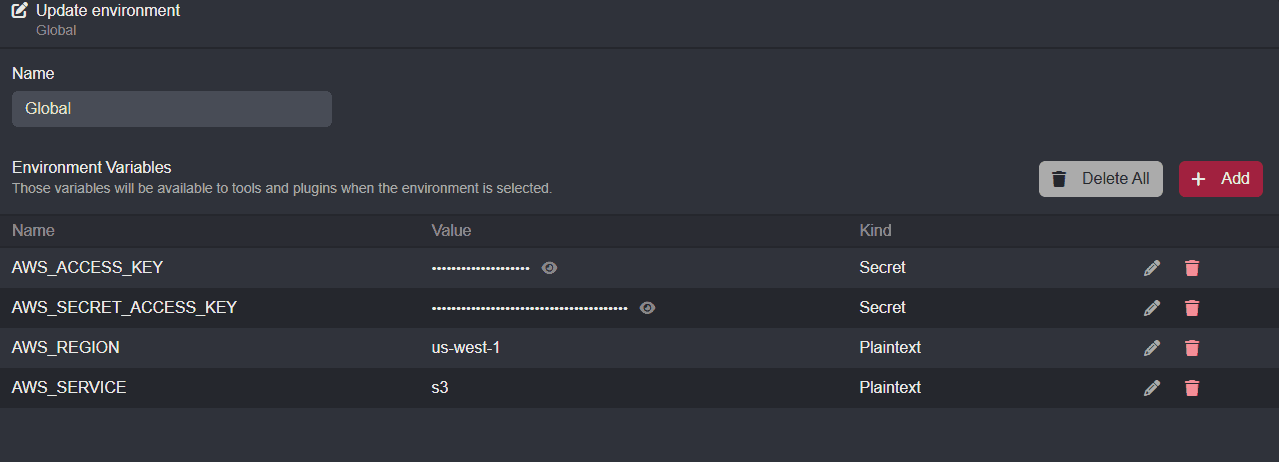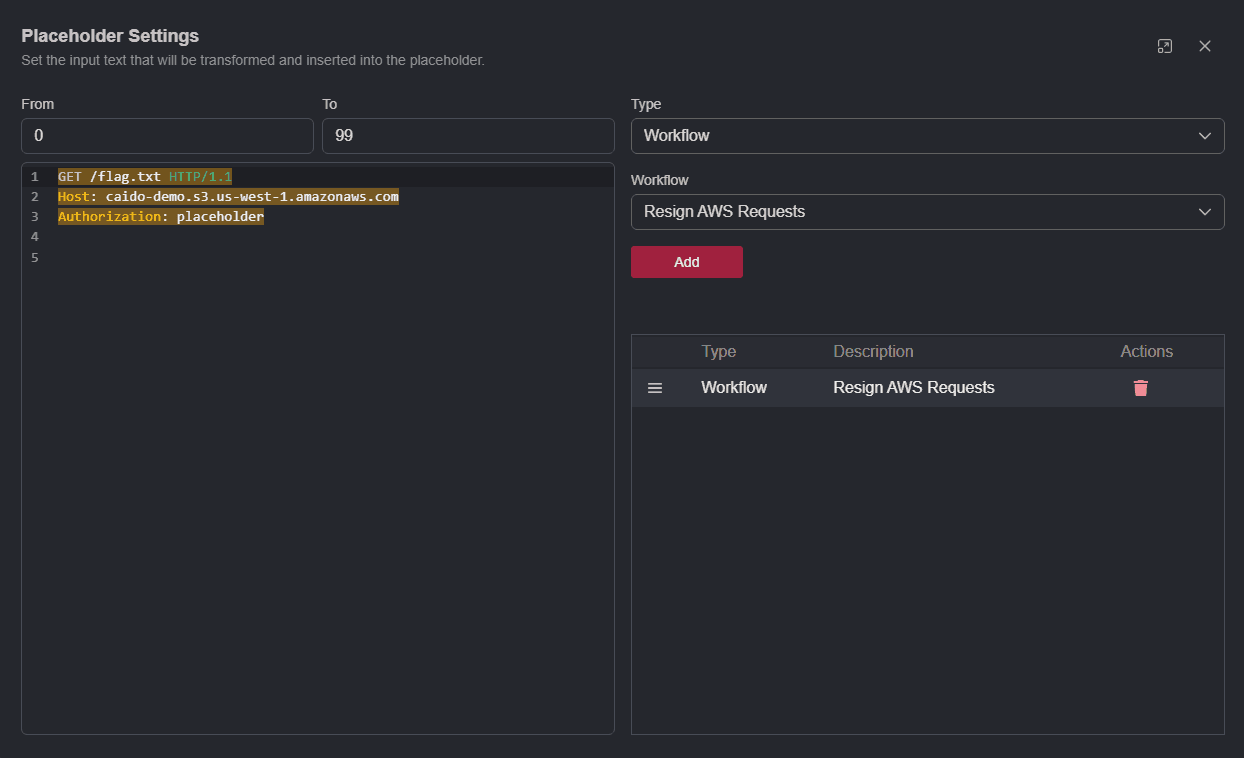Resign AWS Requests Workflow
In this tutorial, we will create a convert workflow that will resign authenticated AWS requests sent in Replay by adding a valid (AWS Signature V4) Authorization header.
Then, by using workflows in Replay, you can achieve continuous, uninterrupted testing without manually updating expired sessions.
TIP
A similar method can be used for other cloud providers as many follow the same signature process.
Creating a Convert Workflow
To begin, navigate to the Workflows interface, select the Convert tab, and click the + New workflow button.

Next, rename the workflow by typing in the Name input field. You can also provide an optional description of the workflow's functionality by typing in the Description input field.
Nodes and Connections
To add nodes to the workflow, click on + Add Node button and then the + Add button of a specific node.
For this workflow, the overall node layout will be:
- The
Convert Startnode outputs$convert_start.datathat represents the request that will undergo conversion. - The
Javascriptnode accesses environment variables to retrieve AWS credentials, creates a signing key, signs the request, and generates a valid authentication header. - Once the header has been returned by the
Javascriptnode, the resigned request will be output, and the workflow will end.
Creating the Environment Variables
For this workflow, you will need to obtain your:
- AWS Access Key ID
- AWS Secret Access Key
- Resource region ID
- Resource service ID
With these values, create environment variables in the Global environment with the following names:
| Name | Value | Value Example |
|---|---|---|
AWS_ACCESS_KEY | Your AWS Access Key ID | AKIAXXXXXXXXXXXXXXXX |
AWS_SECRET_ACCESS_KEY | Your AWS Secret Access Key | xX3X51XXxXx77XXXXXxXXXX83x0XxX+1XXxxx8Xx |
AWS_REGION | Your AWS Resource Region ID | us-east-1 |
AWS_SERVICE | Your AWS Service ID | s3 |

Resigning AWS Requests
- Click on the
Javascriptnode to access its editor and ensure the$convert_start.datais referenced as input data.
- Then, click within the coding environment, select all of the existing code, and replace it with the following script:
import { createHmac, createHash } from "crypto";
import { RequestSpec } from "caido:utils";
function getSignatureKey(key, dateStamp, regionName, serviceName) {
const kDate = createHmac("SHA256", `AWS4${key}`).update(dateStamp).digest();
const kRegion = createHmac("SHA256", kDate).update(regionName).digest();
const kService = createHmac("SHA256", kRegion).update(serviceName).digest();
const kSigning = createHmac("SHA256", kService)
.update("aws4_request")
.digest();
return kSigning;
}
function sign(sdk, spec) {
const accessKey = sdk.env.getVar("AWS_ACCESS_KEY");
const secretAccessKey = sdk.env.getVar("AWS_SECRET_ACCESS_KEY");
const region = sdk.env.getVar("AWS_REGION");
const service = sdk.env.getVar("AWS_SERVICE");
const now = new Date();
const year = now.getUTCFullYear();
const month = String(now.getUTCMonth() + 1).padStart(2, "0");
const day = String(now.getUTCDate()).padStart(2, "0");
const hours = String(now.getUTCHours()).padStart(2, "0");
const minutes = String(now.getUTCMinutes()).padStart(2, "0");
const seconds = String(now.getUTCSeconds()).padStart(2, "0");
const amzDate = `${year}${month}${day}T${hours}${minutes}${seconds}Z`;
const dateStamp = amzDate.slice(0, 8);
const method = spec.getMethod();
const canonicalUri = spec.getPath();
const canonicalQueryString = spec.getQuery();
const host = spec.getHost();
const payload = spec.getBody()?.toRaw() ?? "";
const payloadHash = createHash("SHA256").update(payload).digest("hex");
const canonicalHeaders = `host:${host}\nx-amz-content-sha256:${payloadHash}\nx-amz-date:${amzDate}\n`;
const signedHeaders = "host;x-amz-content-sha256;x-amz-date";
const canonicalRequest = [
method,
canonicalUri,
canonicalQueryString,
canonicalHeaders,
signedHeaders,
payloadHash,
].join("\n");
const hashedCanonicalRequest = createHash("sha256")
.update(canonicalRequest)
.digest("hex");
const credentialScope = `${dateStamp}/${region}/${service}/aws4_request`;
const stringToSign = [
"AWS4-HMAC-SHA256",
amzDate,
credentialScope,
hashedCanonicalRequest,
].join("\n");
const signingKey = getSignatureKey(
secretAccessKey,
dateStamp,
region,
service,
);
const signature = createHmac("sha256", signingKey)
.update(stringToSign)
.digest("hex");
const authorizationHeader = [
`AWS4-HMAC-SHA256 Credential=${accessKey}/${credentialScope}`,
`SignedHeaders=${signedHeaders}`,
`Signature=${signature}`,
].join(", ");
return {
authorizationHeader,
amzDate,
payloadHash,
};
}
export function run({ data }, sdk) {
try {
const spec = RequestSpec.parse(data);
const { authorizationHeader, amzDate, payloadHash } = sign(sdk, spec);
return `Authorization: ${authorizationHeader}\r\nx-amz-date: ${amzDate}\r\nx-amz-content-sha256: ${payloadHash}\r\n`;
} catch (e) {
sdk.console.log(e.toString());
return data;
}
}INFO
If you are using an older workflow (before v0.55.0), use function run(input, sdk) as signature.
We used to pass the raw data directly as the first parameter.
Close the editor window and click on the
Convert Endnode to access its editor.Reference the
$javascript.dataas input data.
Once these steps are completed, close the editor window and click on the Save button to update and save the configuration.
Script Breakdown
It will output three headers (Authorization, x-amz-date and x-amz-content-sha256) that we will inject in our request.
First, the script imports the required cryptographic functions from the backend crypto module and the RequestSpec utility to modify requests.
import { createHmac, createHash } from "crypto";
import { RequestSpec } from "caido:utils";Then, the getSignatureKey function is defined that will create the signing key using a series of createHMAC operations with the secret key, timestamp, region, and service name.
function getSignatureKey(key, dateStamp, regionName, serviceName) {
const kDate = createHmac("SHA256", `AWS4${key}`).update(dateStamp).digest();
const kRegion = createHmac("SHA256", kDate).update(regionName).digest();
const kService = createHmac("SHA256", kRegion).update(serviceName).digest();
const kSigning = createHmac("SHA256", kService)
.update("aws4_request")
.digest();
return kSigning;
}The main sign function uses the .getVar() method to retrieve the environment variables, generates the current timestamp for the x-amz-date component, creates the canonical request with various RequestSpec methods and hashes any body data.
function sign(sdk, spec) {
const accessKey = sdk.env.getVar("AWS_ACCESS_KEY");
const secretAccessKey = sdk.env.getVar("AWS_SECRET_ACCESS_KEY");
const region = sdk.env.getVar("AWS_REGION");
const service = sdk.env.getVar("AWS_SERVICE");
const now = new Date();
const year = now.getUTCFullYear();
const month = String(now.getUTCMonth() + 1).padStart(2, "0");
const day = String(now.getUTCDate()).padStart(2, "0");
const hours = String(now.getUTCHours()).padStart(2, "0");
const minutes = String(now.getUTCMinutes()).padStart(2, "0");
const seconds = String(now.getUTCSeconds()).padStart(2, "0");
const amzDate = `${year}${month}${day}T${hours}${minutes}${seconds}Z`;
const dateStamp = amzDate.slice(0, 8);
const method = spec.getMethod();
const canonicalUri = spec.getPath();
const canonicalQueryString = spec.getQuery();
const host = spec.getHost();
const payload = spec.getBody()?.toRaw() ?? "";
const payloadHash = createHash("SHA256").update(payload).digest("hex");
const canonicalHeaders = `host:${host}\nx-amz-content-sha256:${payloadHash}\nx-amz-date:${amzDate}\n`;
const signedHeaders = "host;x-amz-content-sha256;x-amz-date";
const canonicalRequest = [
method,
canonicalUri,
canonicalQueryString,
canonicalHeaders,
signedHeaders,
payloadHash,
].join("\n");
const hashedCanonicalRequest = createHash("sha256")
.update(canonicalRequest)
.digest("hex");Next, it creates the credential scope and string to sign.
const credentialScope = `${dateStamp}/${region}/${service}/aws4_request`;
const stringToSign = [
"AWS4-HMAC-SHA256",
amzDate,
credentialScope,
hashedCanonicalRequest,
].join("\n");Then, it generates the signing key, creates the final signature, pieces the Authorization header together, and returns it.
const signingKey = getSignatureKey(
secretAccessKey,
dateStamp,
region,
service,
);
const signature = createHmac("sha256", signingKey)
.update(stringToSign)
.digest("hex");
const authorizationHeader = [
`AWS4-HMAC-SHA256 Credential=${accessKey}/${credentialScope}`,
`SignedHeaders=${signedHeaders}`,
`Signature=${signature}`,
].join(", ");
return {
authorizationHeader,
amzDate,
payloadHash,
};
}The run function takes the initial request object as input, converts it to a mutable RequestSpec object, and parses it. Then, the sign function is called to sign the request and insert the valid Authorization header.
export function run({ data }, sdk) {
try {
const spec = RequestSpec.parse(data);
const { authorizationHeader, amzDate, payloadHash } = sign(sdk, spec);
return `Authorization: ${authorizationHeader}\r\nx-amz-date: ${amzDate}\r\nx-amz-content-sha256: ${payloadHash}\r\n`;
} catch (e) {
sdk.console.log(e.toString());
return data;
}
}Testing the Workflow
To test the workflow:
- Send an unauthorized request in Replay to a private S3 bucket object. Without authentication, a 403 response will be returned.

Next, add an arbitrary
Authorizationheader to the request, click, hold, and drag over it, and click the+button to add it as a placeholder.Click on the associated edit button
of the placeholder to open thePlaceholder Settingswindow.
- Use
CTRL+Ato select the whole request. WithWorkflowas theType, click on theSelect a workflowdrop-down menu, select the workflow from the list, and clickAddto save the configuration.

- Close the editor window and click on the
Sendbutton to resend the Replay request.
WARNING
Make sure all your headers are CRLF terminated, the workflow doesn't handle LF terminated headers.
Click on Options -> Display hidden charaters to show them. You should see a \r on each header line.
The Result
The content of the file will be returned in a 200 response.

To view the request as it was sent, navigate to the Search interface and click on the associated request row.

The full workflow is provided below, ready to be imported.
Full workflow
{
"description": "Resigns authenticated requests using the AWS Signature V4 header method.",
"edition": 2,
"graph": {
"edges": [
{
"source": {
"exec_alias": "exec",
"node_id": 0
},
"target": {
"exec_alias": "exec",
"node_id": 2
}
},
{
"source": {
"exec_alias": "exec",
"node_id": 2
},
"target": {
"exec_alias": "exec",
"node_id": 1
}
}
],
"nodes": [
{
"alias": "convert_start",
"definition_id": "caido/convert-start",
"display": {
"x": -70,
"y": 0
},
"id": 0,
"inputs": [],
"name": "Convert Start",
"version": "0.1.0"
},
{
"alias": "convert_end",
"definition_id": "caido/convert-end",
"display": {
"x": 350,
"y": 0
},
"id": 1,
"inputs": [
{
"alias": "data",
"value": {
"data": "$javascript.data",
"kind": "ref"
}
}
],
"name": "Convert End",
"version": "0.1.0"
},
{
"alias": "javascript",
"definition_id": "caido/code-js",
"display": {
"x": 140,
"y": 0
},
"id": 2,
"inputs": [
{
"alias": "data",
"value": {
"data": "$convert_start.data",
"kind": "ref"
}
},
{
"alias": "code",
"value": {
"data": "import { createHmac, createHash } from \"crypto\";\nimport { RequestSpec } from \"caido:utils\";\n\nfunction getSignatureKey(key, dateStamp, regionName, serviceName) {\n const kDate = createHmac(\"SHA256\", `AWS4${key}`).update(dateStamp).digest();\n const kRegion = createHmac(\"SHA256\", kDate).update(regionName).digest();\n const kService = createHmac(\"SHA256\", kRegion).update(serviceName).digest();\n const kSigning = createHmac(\"SHA256\", kService)\n .update(\"aws4_request\")\n .digest();\n return kSigning;\n}\n\nfunction sign(sdk, spec) {\n const accessKey = sdk.env.getVar(\"AWS_ACCESS_KEY\");\n const secretAccessKey = sdk.env.getVar(\"AWS_SECRET_ACCESS_KEY\");\n const region = sdk.env.getVar(\"AWS_REGION\");\n const service = sdk.env.getVar(\"AWS_SERVICE\");\n\n const now = new Date();\n const year = now.getUTCFullYear();\n const month = String(now.getUTCMonth() + 1).padStart(2, \"0\");\n const day = String(now.getUTCDate()).padStart(2, \"0\");\n const hours = String(now.getUTCHours()).padStart(2, \"0\");\n const minutes = String(now.getUTCMinutes()).padStart(2, \"0\");\n const seconds = String(now.getUTCSeconds()).padStart(2, \"0\");\n const amzDate = `${year}${month}${day}T${hours}${minutes}${seconds}Z`;\n const dateStamp = amzDate.slice(0, 8);\n\n const method = spec.getMethod();\n const canonicalUri = spec.getPath();\n const canonicalQueryString = spec.getQuery();\n const host = spec.getHost();\n const payload = spec.getBody()?.toRaw() ?? \"\";\n const payloadHash = createHash(\"SHA256\").update(payload).digest(\"hex\");\n const canonicalHeaders = `host:${host}\\nx-amz-content-sha256:${payloadHash}\\nx-amz-date:${amzDate}\\n`;\n const signedHeaders = \"host;x-amz-content-sha256;x-amz-date\";\n\n const canonicalRequest = [\n method,\n canonicalUri,\n canonicalQueryString,\n canonicalHeaders,\n signedHeaders,\n payloadHash,\n ].join(\"\\n\");\n const hashedCanonicalRequest = createHash(\"sha256\")\n .update(canonicalRequest)\n .digest(\"hex\");\n const credentialScope = `${dateStamp}/${region}/${service}/aws4_request`;\n const stringToSign = [\n \"AWS4-HMAC-SHA256\",\n amzDate,\n credentialScope,\n hashedCanonicalRequest,\n ].join(\"\\n\");\n\n const signingKey = getSignatureKey(\n secretAccessKey,\n dateStamp,\n region,\n service,\n );\n const signature = createHmac(\"sha256\", signingKey)\n .update(stringToSign)\n .digest(\"hex\");\n const authorizationHeader = [\n `AWS4-HMAC-SHA256 Credential=${accessKey}/${credentialScope}`,\n `SignedHeaders=${signedHeaders}`,\n `Signature=${signature}`,\n ].join(\", \");\n\n return {\n authorizationHeader,\n amzDate,\n payloadHash,\n };\n}\n\nexport function run(input, sdk) {\n try {\n const spec = RequestSpec.parse(input);\n const { authorizationHeader, amzDate, payloadHash } = sign(sdk, spec);\n return `Authorization: ${authorizationHeader}\\r\\nx-amz-date: ${amzDate}\\r\\nx-amz-content-sha256: ${payloadHash}\\r\\n`;\n } catch (e) {\n sdk.console.log(e.toString());\n return input;\n }\n}",
"kind": "string"
}
}
],
"name": "Javascript",
"version": "0.1.0"
}
]
},
"id": "2121672b-53d8-4004-aa80-d5021a954ead",
"kind": "convert",
"name": "Resign AWS Requests"
}